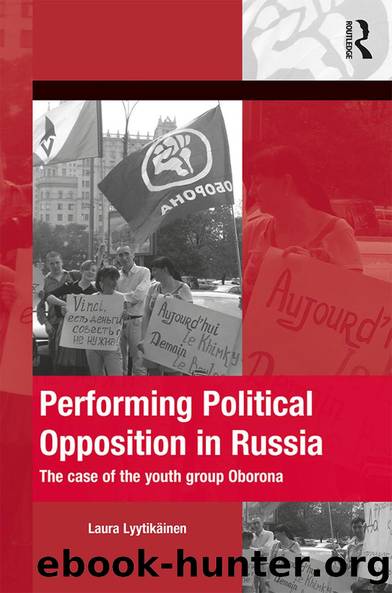Performing Political Opposition in Russia by Laura Lyytikainen

Author:Laura Lyytikainen [Lyytikainen, Laura]
Language: eng
Format: epub
Tags: Social Science, Sociology, General
ISBN: 9781317082293
Google: 9wExDQAAQBAJ
Publisher: Routledge
Published: 2016-10-04T04:30:33+00:00
The official view on democracy: sovereign democracy
Sovereignty and democracy: in this understanding two different phenomena are evaluated. Sovereignty is positioning the country externally, in the world; it is a possibility to exercise oneâs internal and external politics independently, without interference. Democracy is a way of organizing society and the state. This is entirely directed inside the country. (Putin 2006; Suverennaia demokratiia 2007, 45)
In PutinâMedvedev-era Russia, the government has actively sought to install a particular notion of civil society and democracy as the hegemonic interpretation of stateâsociety relations. Russiaâs system of governance has been described by western scholars as âvirtual democracyâ (Wilson 2005), âmanaged democracyâ or âstealth authoritarianismâ (Hahn 2004). Putinâs vision of civil society, in which social organizations are under the firm authority of the state as the highest executive leadership, has been called quasi-civil society or even pseudo-civil society (Evans 2006a, 149). Furthermore, Richter (2009a, 41) suggests that âPutin and his entourage adopted the rhetoric of civil society and bent it to their own purposesâ. These evaluations are often made from the perspective of comparing Russian civil society to the normative western liberal ideal of what civil society and civic participation should be, and seeing these as universally applicable. This understanding tends to see civil society as an independent and separate counter-force to the state and emphasizes individual liberties and civil societyâs surveillance of the state (Pulkkinen 1996).
However, according to Hemment (2012), the Russian stateâs official discourse on civil society is based on a view that the idea of civil society introduced to the country by the western-identified agencies in the 1990s is in fact flawed and oriented more towards western interests than those of the Russian state and its citizens. With sovereign democracy, the Russian government has proposed a vision of civil society, which is linked to state sovereignty (gosudarstvennostâ) and in which self and nation are indivisibly connected (Hemment 2012; Richter 2009b). Western civil society development projects in the 1990s emphasized the importance of free civil society in the democratization process, and the concept of civil society has continued to circulate in Russia even after the international foundations withdrew their activities (Hemment 2012, 244). Civil society remained an important ideological signifier, but the concept morphed into new meanings in the countryâs modernization projects and in the context of the governmentâs rhetoric of sovereign democracy (Hemment 2012, 244).
As a part of the struggle to define civil society in Russiaâs âown termsâ, the government has strongly condemned the foreign support to Russian NGOs. According to Putinâs former advisor Gleb Pavlovskii, striving for western grants has forced organizations to accept foreign concepts of rights which are not efficient in protecting the interests of Russian citizens (Evans 2006a, 150). Statements about the âColour Revolutionsâ also show the governmentâs suspicion towards the West. Russian state officials have represented these popular uprisings in Central Europe and the Commonwealth of Independent States (CIS), known as the Colour Revolutions, as part of a western conspiracy and portrayed as a revolutionary threat to the country. Additionally,
Download
This site does not store any files on its server. We only index and link to content provided by other sites. Please contact the content providers to delete copyright contents if any and email us, we'll remove relevant links or contents immediately.
| Historic | Information Systems |
| Regional |
Man-made Catastrophes and Risk Information Concealment by Dmitry Chernov & Didier Sornette(6009)
The Revenge of Geography: What the Map Tells Us About Coming Conflicts and the Battle Against Fate by Kaplan Robert D(4076)
Zero Waste Home by Bea Johnson(3835)
COSMOS by Carl Sagan(3618)
Good by S. Walden(3549)
In a Sunburned Country by Bill Bryson(3537)
The Fate of Rome: Climate, Disease, and the End of an Empire (The Princeton History of the Ancient World) by Kyle Harper(3061)
A Wilder Time by William E. Glassley(2859)
Camino Island by John Grisham(2797)
Organic Mushroom Farming and Mycoremediation by Tradd Cotter(2689)
The Ogre by Doug Scott(2679)
Human Dynamics Research in Smart and Connected Communities by Shih-Lung Shaw & Daniel Sui(2500)
Energy Myths and Realities by Vaclav Smil(2488)
The Traveler's Gift by Andy Andrews(2458)
9781803241661-PYTHON FOR ARCGIS PRO by Unknown(2365)
Inside the Middle East by Avi Melamed(2352)
Birds of New Guinea by Pratt Thane K.; Beehler Bruce M.; Anderton John C(2254)
A History of Warfare by John Keegan(2240)
And the Band Played On by Randy Shilts(2199)
